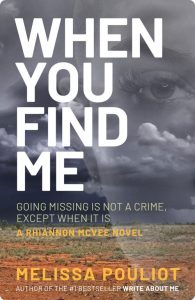When You Find Me
“Going missing is not a crime, except when it is.”
As Australia leaves behind the 1980s and enters a new decade, more and more people are going missing, every hour, every day. Sydney teenage runaway Keely is still missing. Queensland cowboy Toby is still missing. Brian, the quiet baker married to his childhood sweetheart with five children, goes missing after a rampage in his suburban inner Sydney home. Beautiful Ayala Philips, the mother of four who has it all, has evil thoughts about her husband Clive then disappears in the vast Australian outback without a trace.
Drawn to the missing, new recruit on the beat at Kings Cross in Sydney, Rhiannon McVee, is determined to be the one to find them. But she is the odd one out in her quest for the missing, while she navigates her way around a corrupt inner Sydney culture to get into the Detective’s unit. As tragedy after tragedy unfolds on the job, Rhiannon must face her own personal tragedy, before she loses the love of her life, Mac, and becomes lost to herself. And if Rhiannon disappears, who will find the missing?
Reading Group Questions
What is the significance of this book being set in the early 90s?
Is it difficult to imagine policing in this era when technology was so far behind where it is today?
Discuss the culture of the police force in this era compared with today.
Rhiannon cries a lot in this book. The author was going through a lot of heartache while she was writing and upon reflection, believes that this has come through in her character. Discuss.
Is the book fact or fiction?
This is a great question and I get asked all the time.
“The best lie is the one that has an element of truth, so it’s good to include something real in your fiction.” Renee Conoutly , Australian writer
Although all my crime novels are inspired by my first cousin Ursula Barwick who disappeared after she boarded a train bound for Sydney in 1987, these are fiction, not fact about Ursula. The readers of When You Find Me know what is happening behind the scenes and see the different ‘missing’ journeys through their eyes. But sadly, as I am writing this novel, none of us know what happened to Ursula after she reached Sydney.
When I published Write About Me, then continued with this Detective Rhiannon McVee series, I decided to share the story behind the story because I wanted people to know Ursula wasn’t just a two-dimensional face on a Missing Persons poster.
But most of all I want the world to know what it’s like when families and friends, investigators, school teachers and friends of friends have to go on with their lives while their missing person remains missing.
And by putting Ursula’s story at the back of my books, I am also hoping that somebody, somewhere might come forward and help our family find some sort of end point in regards to her disappearance.
Who is Rhiannon McVee ?
A twenty-something girl from the Australian outback with her eyes set firmly on being a detective. Her career starts in the late 80s at Kings Cross Police Station, amongst a dominant male police force who see so many people go missing that one missing person just blends in with the next. But Rhiannon’s no pushover, and doesn’t take no for an answer when she’s on a case. Off the job Rhiannon is like any normal girl in her twenties, she loves to party, she loves her family and she loves her cowboy who waits patiently for her to return to her outback home.
Rhiannon McVee is also the detective I have created as my own fairy godmother, who I wish was in our lives in 1987. It’s people like Detective Rhiannon McVee who make our lives better and help us find our missing loved ones. And when we do, she’s there to help us pick up the pieces.
How difficult is it to fictionalise what you have experienced in real life ?
Fictionalising a real life experience the way I have gives me some distance and allows me to explore the experiences of others. All my characters have something important to say about missing persons. For example, take Rhiannon McVee. I’m so captivated by her I’ve created a detective crime mystery series in her honour. Through her experiences and those of the people she’s looking for, I’m able to convey the issues and feelings that surround missing people.
Rather than get dragged down by my own experiences missing Ursula, writing fiction helps me channel my energy into a reinvigorated search for answers. Through my books I am giving a voice to Ursula, and to all of those who are missing.
Your books are drawn to two distinct places – Kings Cross and the Australian outback. Can you explain the significance of location for a writer ?
Location is extremely important when I am piecing my stories together. While I write I see the scenes play out in my mind like a movie, and location plays such an important part.
Both Kings Cross and the Australian outback have a real sense of mystery about them. They’re intriguing and although vastly different, evoke similar feelings for the reader. The outback is such an isolated and lonely place, and with that comes a sense of foreboding and danger. Kings Cross is so small size-wise compared to the outback and it’s busy and hectic and noisy, but has the same sense of foreboding and danger.
I love moving from one space to the next in my books, as both provide dramatic backgrounds for my characters.


